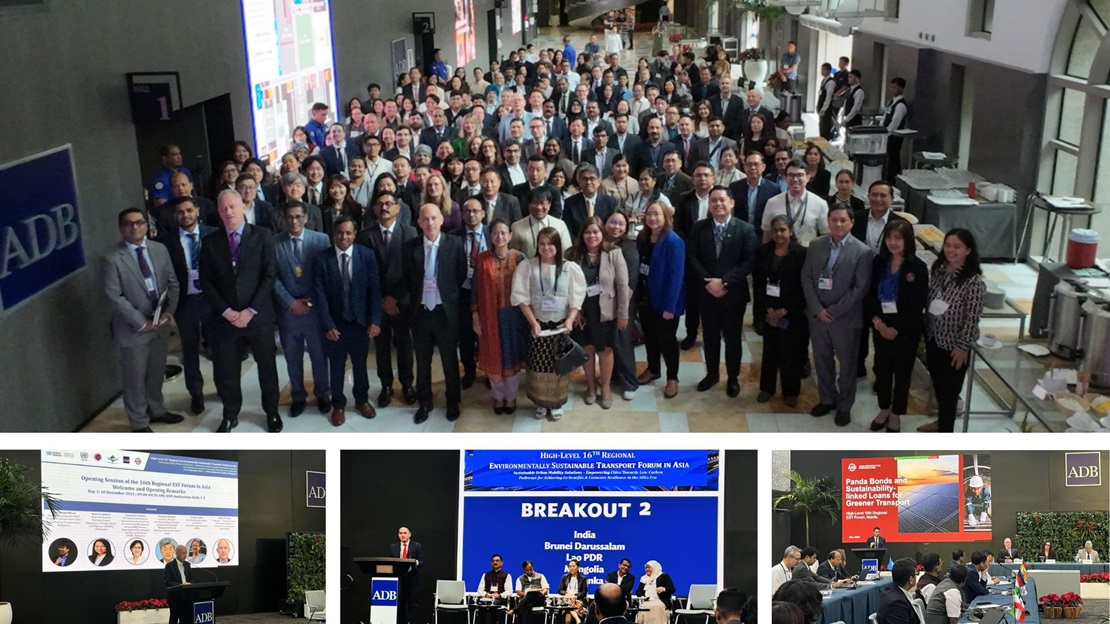For the first time, the Asian Infrastructure Investment Bank (AIIB) co-organized the High-level Regional Environmentally Sustainable Transport (EST) Forum, one of the most relevant sustainable transport events conducted in Asia. Held in Manila in late 2024, the Forum welcomed over 200 participants from 30 countries.
With green infrastructure as one of its corporate priorities, AIIB’s participation in the forum is aligned with how it supports its members to meet their environmental and development goals in transport infrastructure.
Since 2005, the Regional EST Forums have brought together national governments with various line-ministries (transport, environment, health, urban and rural development, highways and railways) and development partners in their quest for more sustainable transport development. The recent forum included a review and discussion of the three goals from the Aichi 2030 Declaration on realizing progress in achieving universally accessible, safe, affordable, efficient, clean, low-carbon, resilient, multi-modal passenger and freight transport in Asia.
The forum also sought ideas and inputs to the Implementation Plan for the UN Decade of Sustainable Transport that will be launched in late 2025. It was hosted by the Government of the Philippines and co-organized by AIIB, the Ministry of the Environment of Japan, the Asian Development Bank (ADB), and the United Nations Centre for Regional Development of Division for Sustainable Development Goals/United Nations Department of Economic and Social Affairs (UNCRD-DSDG/UN DESA).
During the opening session, AIIB’s Andrés Pizarro, Manager, Public Sector Clients Department (Region 1), highlighted three pillars to achieve sustainable urban transport:
- inclusive pedestrian and non-motorized transport infrastructure,
- prioritization of public transit, and
- optimizing existing road infrastructure.
He stressed the importance of balancing the environmental, economic and urban access goals of the Aichi 2030 Declaration.
“The incremental cost of low-carbon transport systems benefits people beyond the transport functions of the services and beyond the country where the services operate,” Pizarro said. “As a result, high-income countries, who benefit from these improvements, should contribute funding to low-income countries to assist in the qualitative leap involved in transforming existing urban transport infrastructure and services to low-carbon ones to reduce their global impact.”
AIIB shared its experience on nature-positive transport, green financing and sustainable urban mobility. Discussions focused on integrating nature-based solutions into transport planning, leveraging digital technology for smarter mobility, and advancing innovative financing tools, such as the Panda Bonds and the Sustainability-Linked Loans, to scale up investments in mass transit and low-carbon infrastructure.
In 2024, all 18 transport projects approved by AIIB were aligned with the Green Infrastructure thematic priority, reinforcing AIIB’s commitment to tackling climate change and promoting biodiversity conservation and nature-based solutions in the transport sector.
During the Forum, AIIB moderated discussions among representatives from Brunei Darussalam, India, Lao PDR, Mongolia and Sri Lanka, from which a common theme of collaboration and leveraging innovative solutions emerged. High-level bilateral meetings with Cambodia, Lao PDR, Nepal and the Philippines explored opportunities to advance transport projects aligned with the goals of the Aichi 2030 Declaration.
AIIB also co-chaired the 2nd Asian Transport Observatory (ATO) Advisory Committee to explore avenues to leverage high-quality data to inform the preparation of more sustainable transport operations.
AIIB continues to chart a path toward a more resilient and greener transport sector in Asia and beyond by promoting partnerships, sharing knowledge and driving innovative solutions.


